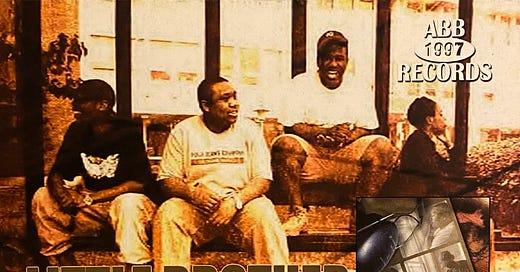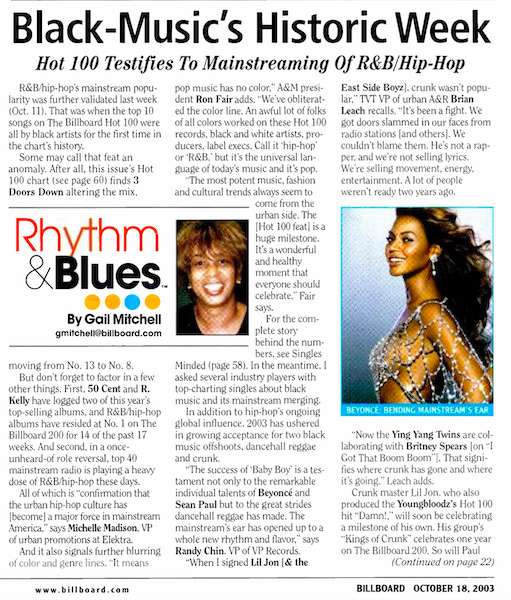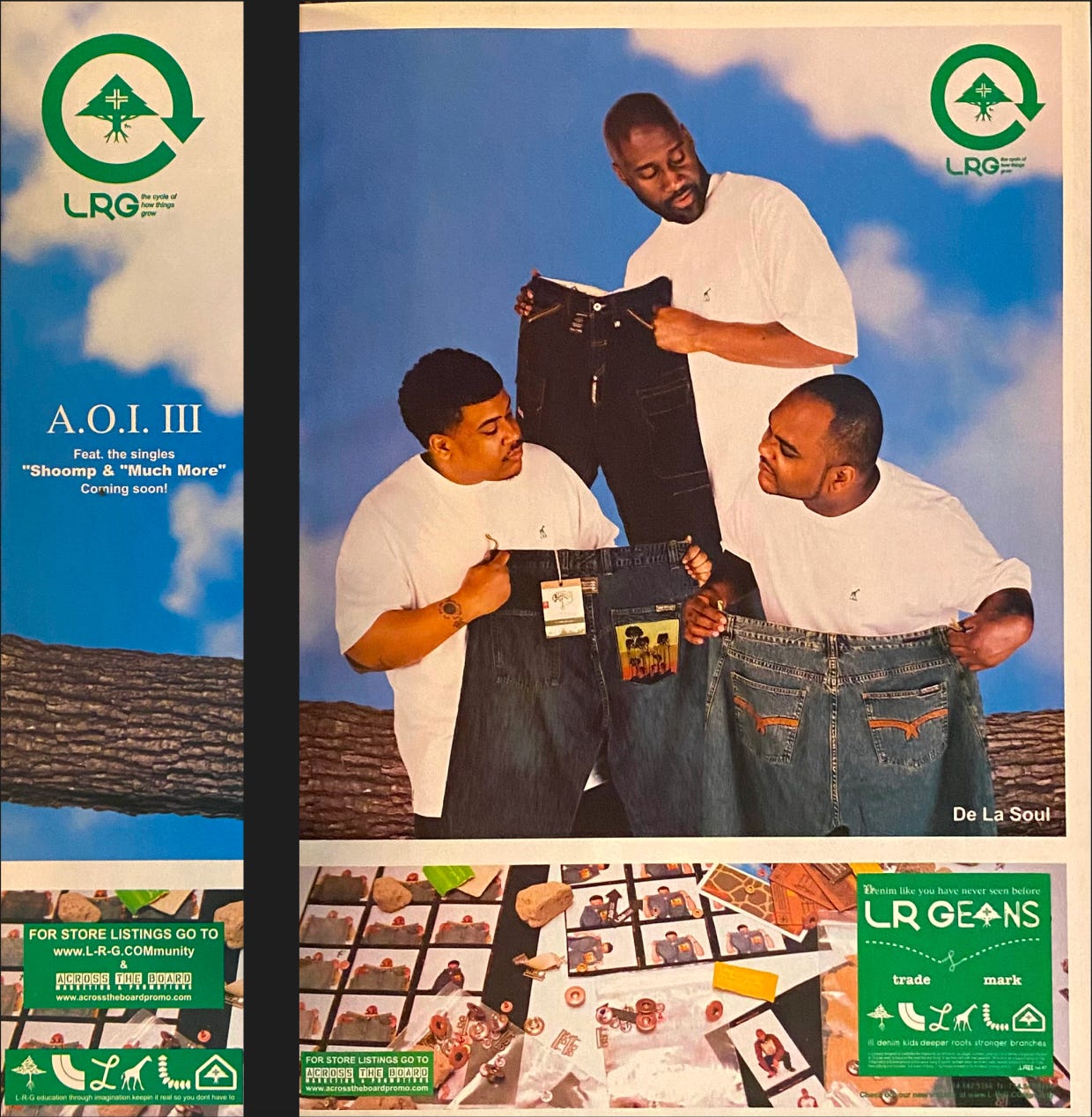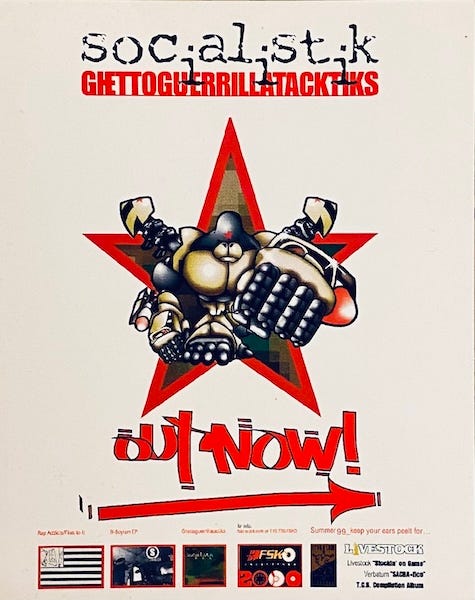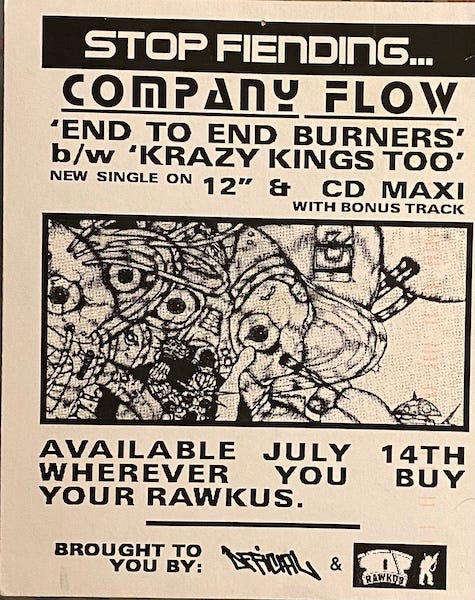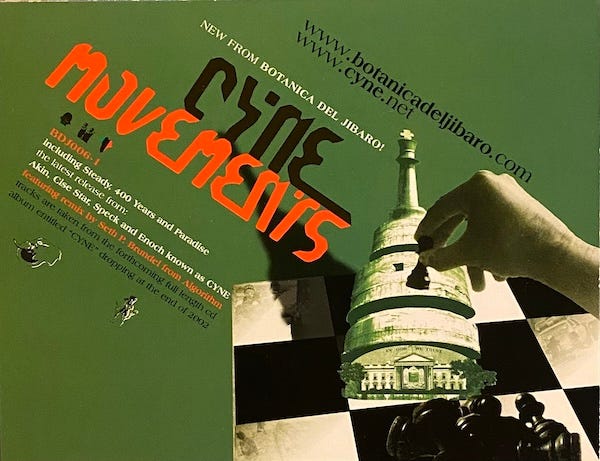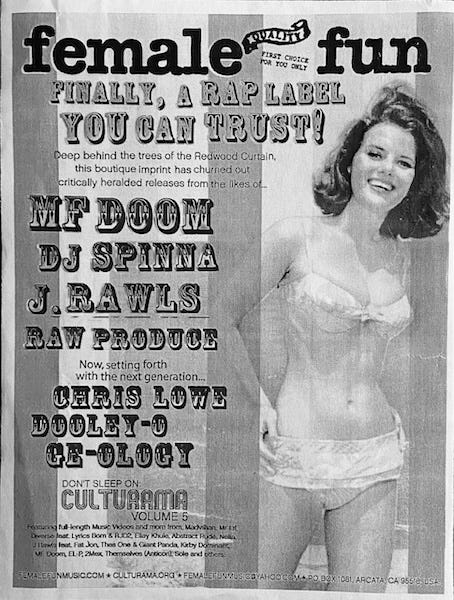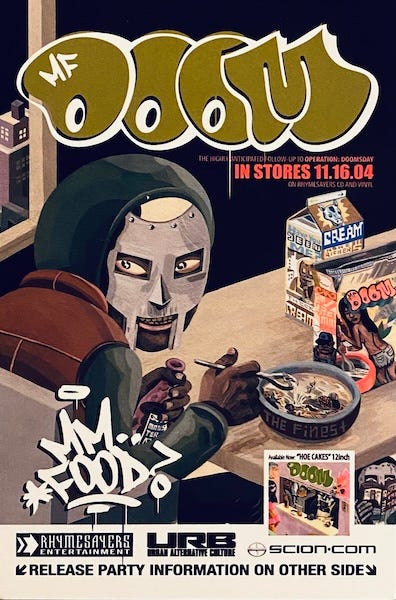Cutting Room Jams: 2000 and Late
Subplots from hip-hop in 2003, plus a collection of vintage rap postcards and flyers.
It’s roughly 24 hours after you should have received the latest installment of Cutting Room Jams. This is due to offline events that I won’t get into here, though I will admit that my original title for this newsletter was “Postcards from Hell.” I decided to wait until I was in a better place mentally.
The best-of-2023 season is already in full swing. Much like Christmas, overeager critics and fans seem to start the party earlier every year. I’ve contributed to a few lists, but I’m going to save those for the next edition.
Instead, I’d like to offer items inspired by my most recent Humthrush list, The Best Rap Singles of 2003.
All-Black Top 10
Rap fans who followed the genre in 2003 will remember three key events, including the massive success of 50 Cent’s Get Rich or Die Tryin’ and Outkast’s Speakerboxxx/The Love Below. In 2004, the latter won the Grammy Award for Album of the Year — damnably, the last hip-hop artist to do so to date.
Meanwhile, the October 13 issue of Billboard brought the first all-Black top 10 pop chart in the magazine’s history. “For a [hip-hop] movement that spent decades struggling for acceptance, endured condescension from the same R&B world that now ached to copy its innovations and weathered cultural shifts that too often prioritized violence and conformity over artistic innovation, it must have seemed like an incredible accomplishment,” I wrote in the introductory essay to the Best of 2003 list.
Billboard celebrated the landmark week with a pair of stories in its October 18 issue. Gail Mitchell’s “Rhythm & Blues” column featured a claim from A&M Records president Ron Fair crowed that “we’ve obliterated the color line.”
However, that “color line” reemerged only a decade later. In 2013, just one artist of color topped the charts as a lead: Bruno Mars. (Several Black artists appeared as guests on number-one songs, including Wanz on Macklemore & Ryan Lewis’s “Thrift Shop,” T.I. and Pharrell Williams on Robin Thicke’s “Blurred Lines,” and Rihanna on Eminem’s “Love the Way You Lie.”)
For those interested in dense statistical analysis, the “Singles Minded” column explains how changes in Billboard’s formula for calculating hits led to the all-Black top 10 chart. Billboard remains the U.S. industry standard, but it’s worth remembering that their charts are simply estimates of popularity, not exact sales numbers.
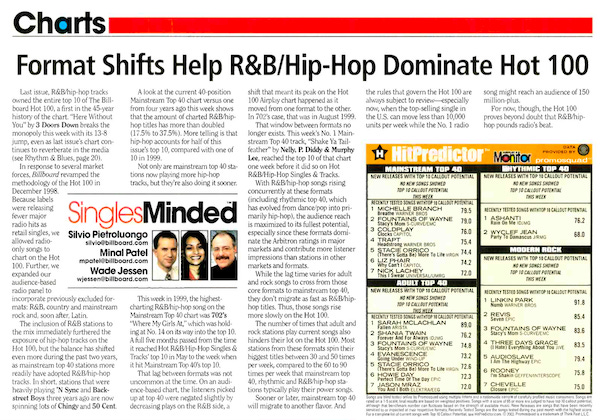
2003 Ads for Lost Albums
The year 2003 also brought announcements for albums that were never released and/or were retitled before appearing in stores.
In January 2003, The Source published an advertisement for Ras Kass’ Goldyn Chyld. The Carson, CA rapper’s third album underwent title and track changes after Priority Records mailed promo copies of Van Gogh in 2001. (I reviewed Van Gogh for The Source that year.) Priority/Capitol then released a teaser single, the DJ Premier-produced “Goldyn Chyld” before shelving Ras Kass’ album permanently. The troubled rapper’s ornery reputation as well as a DUI arrest and conviction didn’t help matters. Goldyn Chyld has been widely bootlegged and a version of it appears on streaming services.
January 2003 rap mags featured a campaign for DMX’s purported fifth album, It’s Not a Game. (Per publishing custom, issues dated January 2003 issues appeared on newsstands the previous month.) It was retitled Grand Champ before Def Jam released it on September 16, 2003. DMX remains the only artist to top the Billboard charts with his first five albums.
The June 2003 issue of XXL brought an ad for Caddillac Tah’s POV City Hustler. Set for a June 3 release after years of delays, the album should have brought welcome attention to a Queens rapper who was overshadowed by Murder Inc. stars like Ashanti, Vita, and Charli Baltimore — all who starred on the 2002 hit “Down 4 U.” But June 3 came and went, and POV City Hustler has yet to appear in any form.
Not much can be found online about Hoodrich Records, a Chicago label formed by Amando “Doe” Sanders and Kevin “KB” Brown. Much like Demetrius “Big Meech” Flenory of BMF and too many others to mention, Sanders apparently used his street notoriety to try and launch a music empire. But despite a July 2003 XXL ad for new projects from Texas rappers like onetime Rap-a-Lot artist DMG and Big Twinz, there’s little evidence the label released anything besides a few promos. Sanders was murdered in 2021.
A July 2003 Rawkus ad in XXL promoted Innervision, Pharoahe Monch’s long-awaited follow-up to his 1999 solo debut, Internal Affairs. “Look out for the new single, ‘Agent Orange,’” reads the tagline. Thanks to production from rising L.A. team Sa-Ra Creative Partners, “Agent Orange” earned some industry buzz. But Rawkus never released Innervision. It took eight years and a switch to SRC/Universal before Pharoahe Monch issued his second album, Desire, in 2007.
The Rawkus ad also spotlights Novel, a rapper/singer with familial ties to soul greats — his grandfather is Solomon Burke and his father is Motown executive William “Mickey” Stevenson. A tagline claimed, “The highly-anticipated debut album, The Word, coming soon. The single, ‘Peach,’ out now.” “Peach” came out, but The Word did not, although Rawkus mailed promo samplers of the latter.
Here’s another Novel ad from XXL’s October 2003 issue, courtesy of the L.A. street brand Drunknmunky, that claimed that The Word would drop in 2004. After leaving Rawkus/MCA, Novel found his industry footing as a songwriter for Alicia Keys, Leona Lewis, Joss Stone and others.
2003 not only belonged to 50 Cent and Outkast, it was also the year of crunk, thanks to Lil Jon. This splashy TVT ad from The Source’s August 2003 issue salutes the magazine’s 15th anniversary as well as the King of Crunk’s dominance. It promises three albums that never came out: Snoop Dogg affiliates Tha Eastsidaz’s Gang Bang Music, Atlanta rapper Chyna Whyte’s Bad Blood, and Atlanta singer Oobie’s Oobaybi.
Finally, this ad from XXL’s September 2003 issue finds De La Soul promoting the Lifted Research Group (LRG) brand as well as AOI III, the final installment in their controversial Art Official Intelligence trilogy. But after leaving Tommy Boy Records, De La Soul canceled AOI III. In 2004, they released The Grind Date on Sanctuary Records.
Rap Postcards and Flyers
Recently, I’ve been going through my collection of postcard-sized advertisements. Most of them date back to the turn of the century, when I began writing for national outlets. (Note the postcard for Little Brother’s The Listening at the top of this newsletter.)
Here’s a flyer for Socialistik’s Ghettoguerillatacktiks. The Sacramento group briefly signed to Priority Records before releasing a few independent cassette EPs in the 1990s. This was their only full-length album before they faded in the early 2000s.
This postcard trumpets Company Flow’s 1999 single, “End to End Burners” b/w “Krazy Kings Too.” It was arguably the famed Brooklyn “independent as fuck” trio’s last major release. Within months, Big Juss fell out with El-P and left the group. El-P and DJ Mr. Len soldiered on with an underpromoted instrumental album, Little Johnny from the Hospitul, left Rawkus, and started work on a proper follow-up to 1997’s Funcrusher Plus for El-P’s new Def Jux imprint before finally breaking up in 2001.
This flyer promotes “Movements,” a three-track 12-inch from Gainesville, FL quartet Cyne. I’ve written in this newsletter before about Cyne, an underrated crew who remain better known in Europe and Japan beat scenes than in America.
Writer, DJ, videographer and show promoter Peter Agoston started Female Fun Records in 2001 with an auspicious debut: MF DOOM aka Metal Fingers’ Special Herbs, Vol. 1. (He and I both wrote for URB magazine, and I commissioned reviews from him when I worked at Miami New Times.) This flyer promotes the label as well as Agoston’s Culturama, a collection of indie-rap music videos that he compiled on VHS and DVD.
Speaking of DOOM, here’s one for Mm…Food? Note the URB and Scion brands at the bottom. The former produced marketing content for Toyota’s youth-focused Scion marque throughout the 2000s.
One more: Blu & Exile’s Below the Heavens. I didn’t realize until looking at the image now that Koch Distribution handled this classic indie album. At any rate, L.A. imprint Sound in Color collapsed shortly after Below the Heavens’ release in 2007, briefly making the CD quite rare. Discs used to trade for over $100 online before Fat Beats began manufacturing reissues in 2012.
Goodbye from hell for now.
